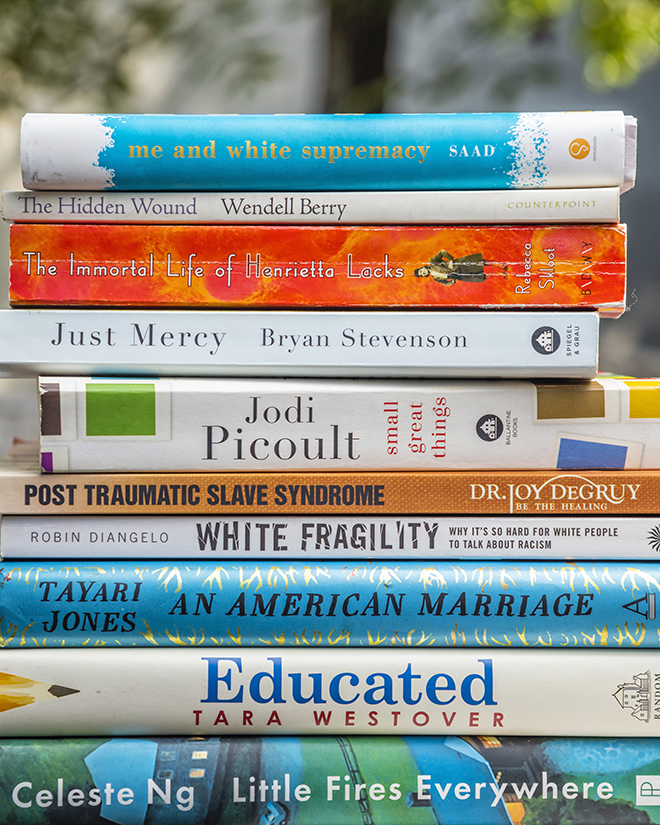
Photography by Danny Fulgencio
For years, Pam Fields has worked tirelessly through her nonprofit to bring diverse individuals together through programs and events designed to encourage cross-cultural understanding. But keeping the fight against racism can be exhausting, and she needed an outlet to share her struggles and experiences without the burden of leadership.
She found allies in the Multicultural Women’s Book Group.
East Dallas neighbor Jean McAulay and Oak Cliff resident Shannon Cerise started the group in 2017 after attending the Questions of Color panel hosted by The Dallas Morning News following the killing of five police officers at a Black Lives Matter march in 2016. After hearing people of color share their experiences at the event, they sat in the parking lot thinking, “We lead such segregated lives.”
They wanted to continue the conversation. As members of the Dallas Institute of Humanities and Culture, where the panel discussion occurred, they utilized the organization’s email list and social media channels to recruit new members throughout Dallas.
The group is open to anyone, regardless of race, age, religion or sexual orientation, but membership is restricted to women.
“We don’t have anything against men, but we feel women, most often, are the community builders,” McAulay says. “They forge relationships with neighbors.”
Each meeting starts with an icebreaker activity, followed by a poem and book discussion. The group started with “American Dervish,” which tells the story of a Pakistani-American boy who struggles with his identity and religion while growing up in the Midwest. Other books have delved into race, white privilege, immigration and politics.
The books generate conversation about difficult social issues that sometimes cause perspectives to clash. The first discussion of Robin DiAngelo’s controversial book “White Fragility” was so contentious, members had to pause and regroup for a second discussion at a later date.
Ground rules for respectful participation keep most meetings civil, however. Members are asked to practice the pause if the conversation becomes tense or emotional and to assume the best in each other. If someone says something insensitive, members are encouraged to teach without reprimanding.
“I’m developing muscles about how to talk about race, not just understand it,” Cerise says. “I don’t think it’s ever going to be easy, but I’m finding words and language to go along with it.”
Yet reading and discussing books aren’t the sole purpose of the group. It was never meant to be an intellectual pursuit, McAulay says. It’s about building relationships that create real community change. Ladies meet regularly outside of book club to go bowling or attend lectures.
“The more cross-cultural relationships we build, the better we understand, the more our hearts and minds are transformed and we can be advocates for each other,” Fields says.
Membership is intentionally kept small. When new women want to join, McAulay and Cerise connect those people and help them establish their own book groups. A second chapter that meets at Southern Methodist University formed about a year ago, and a third chapter started in Lakewood in August.
Interest in the Multicultural Women’s Book Group grew after the death of George Floyd at the hands of Minneapolis police in late May. His slaying ignited a racial reckoning and spawned mass protests across the country.
“Especially among white women, we saw a strong interest in learning more,” McAulay says. “We can be amazingly clueless on issues of race and the experiences of people of color in white-dominant culture. The protests and the murder of George Floyd brought that to the fore. The next step is, ‘How do I make this better?’”
Lakewood neighbor Jeanne Segrest, an original member of the Multicultural Women’s Book Group, posted about the group on Lakewood Facebook pages to gauge community interest in starting a neighborhood chapter. Sixteen women primarily from Lakewood and East Dallas attended the initial meeting.
“For a long time, I had been feeling tension like, ‘Why are we not talking about this?’” Segrest says. “I wanted to scream out the window every time something happened. It’s a hard conversation to have, but we have to push through that uncomfortable feeling.”
St. John’s Episcopal mom Tunisia Blanca says she wanted to join the book club after Floyd’s death to share her experiences as a Black woman.

“I couldn’t believe as a country we had gotten to a place where people stood around and watched and did nothing,” Blanca says. “I never considered myself an activist, but I thought of myself as someone who spoke up about what’s wrong. I thought, ‘I’ve got to do more.’ I want to lend my voice and give my perspective.”
Everyone in the group serves as an active participant by volunteering to bring snacks, selecting the books or leading discussion. Discussions focus on listening and learning from personal experiences, not trying to change opinions. Engaging in the experiences of others is the best way to recognize personal biases and advocate for systemic change, members say.
The women put their money where their mouths are. After reading “Just Mercy,” the story of a lawyer who founded the Equal Justice Initiative to defend the unjustly accused, they collected money and sent a donation to the organization.
“I’m just happy for the new group,” Segrest says. “I want it to keep spreading. This isn’t the only answer to racism, but it’s one thing we do.”
For more information, visit mwbgdallas.com.
The Multicultural Women’s Book
Group Reading List
-
Homegoing
-
The Immortal Life of Henrietta Lacks
-
Retablos: Stories from a Life Lived Along the Border
-
First They Killed My Father: A Daughter of Cambodia Remembers
-
The Accommodation: The Politics of Race in an American City
-
Your House Will Pay
-
Hidden Wound
-
American Spy
-
Me and White Supremacy: Combat Racism, Change the World and Become a Good Ancestor
-
Educated
-
Boy, Snow, Bird
-
Secrets of the Casa Rosada
-
Post Traumatic Slave Syndrome: America’s Legacy of Enduring Injury and Healing
-
Just Mercy
-
Maid





